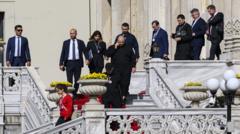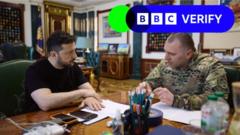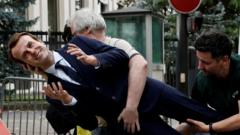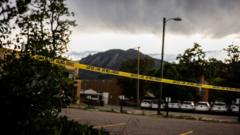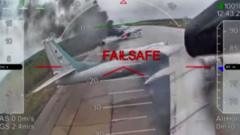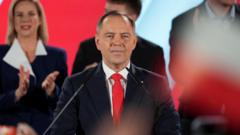General Carsten Breuer warns of a significant threat from Russia, hinting at a potential attack on NATO members within the next four years due to accelerated military production.
Possible Russian Attack on NATO Warned by German Defence Chief
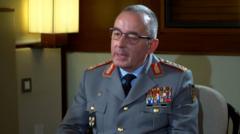
Possible Russian Attack on NATO Warned by German Defence Chief
Germany's chief of defence emphasizes need for NATO preparedness against Russia's escalating military capabilities.
Germany's chief of defence, General Carsten Breuer, has raised alarms regarding a probable Russian attack on NATO countries within the next four years. During his remarks at the Shangri-La Dialogue in Singapore, he highlighted Russia's substantial military buildup, specifically citing the production of around 1,500 main battle tanks annually, many of which are positioned for possible assaults on NATO's Baltic members by 2029 or even sooner.
Breuer's comments come ahead of the upcoming NATO summit in The Hague, where member nations are expected to deliberate on their defense budgets amid ongoing tensions stemming from the conflict in Ukraine. He characterized the current threat from Russia as unprecedented in his 40-year military career, urging NATO allies to enhance their defenses.
He explained, "Russia is building up its forces to an enormous extent," with significant military production not solely directed at the conflict in Ukraine but also stockpiled for future confrontations. Highlighting his concerns, he noted that Russia's 2024 munitions production includes four million rounds of artillery, indicating preparation for further military engagements.
Breuer highlighted the precarious nature of the Suwalki Gap, which borders Poland, Lithuania, and Belarus, pointing out that this area is exceedingly vulnerable to potential Russian incursions. He recounted an analogy from Estonian officials, expressing that those closer to the threat are acutely aware of its dangers, unlike those in Germany who are more distant from the frontline.
The stark differences in perceptions among European nations regarding the Russian threat were emphasized, as Breuer acknowledged that Moscow's perspective of the Ukraine conflict differs dramatically from the NATO viewpoint. He suggested that Russia sees its actions as part of a continuous struggle against NATO and is probing for weaknesses in defense lines.
In response to the rising threats, Breuer called for NATO allies to intensify their military preparations, asserting, "We need to ramp up our defense capabilities," and ensure collective deterrence against potential attacks. While acknowledging tensions among NATO members, particularly with Hungary and Slovakia's closeness to Moscow, he nonetheless affirmed the alliance's overall unity, applauding the accession of Finland and Sweden to NATO as a strong indication of collective defense acknowledgment.
Breuer's warnings reflect a broader recognition within Germany of the urgent need to enhance military readiness. Following years of military investment declines, the German government is now reassessing its defense priorities, a shift that even includes support from traditionally pacifist factions like the Green Party. Nonetheless, as military leaders champion increased readiness, questions linger regarding Europe’s capacity to meet the operational demands of a potential conflict against Russia, especially considering the relative slowdown of U.S. defense commitments on the continent.


